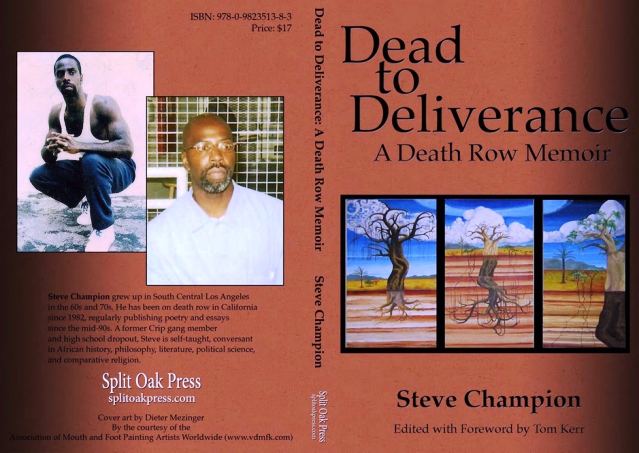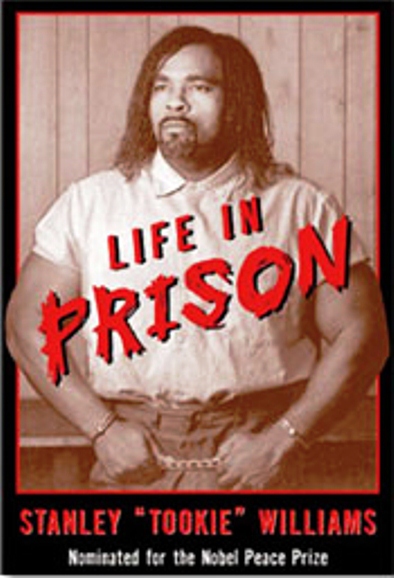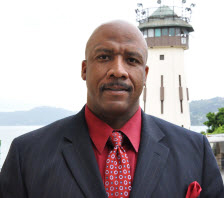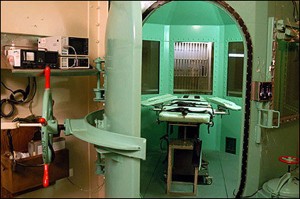By Mary Ratcliff, editor, San Francisco Bay View newspaper
October 9, 2012
Word has just reached us that Steve Champion, a prisoner on San Quentin’s death row well known as an inspirational advocate for justice and as one of the trio with Stanley Tookie Williams and Anthony Ross, began a hunger strike last Thursday, Oct. 4.
His demands – still unmet – are listed in “The struggle never stops,” published in the July San Francisco Bay View newspaper and reprinted below. He asks that all who believe in justice call and write the warden and Corrections Department (CDCR) spokespersons to say:
“We are aware of Steve Champion’s hunger strike and concerned for his health. We look to you to respond to him promptly, constructively and appropriately.”
Call and write:
- San Quentin Warden Kevin Chappell, Kevin.Chappell@cdcr.ca.gov ” or (415) 454-1460
- CDCR Press Secretary Jeffrey Callison, Jeffrey.Callison@cdcr.ca.gov
- CDCR Deputy Press Secretary Terry Thorton, Terry.Thornton@cdcr.ca.gov
Also, click on http://www.change.org/petitions/san-quentin-prison-warden-kevin-chappell-respond-to-prisoner-steve-champion-s-hunger-strike-demands-constructively to sign online.
“Steve Champion, death row prisoner and author of ‘Dead to Deliverance, A Death Row Memoir,’ has been held in administrative segregation, without phone and other privileges, since just prior to the execution of his friend Stanley Tookie Williams in December 2005,” writes Steve’s friend, Professor Tom Kerr of Ithaca College, in an afterword to Steve’s essay, “Gang validation: The new inquisition,” published Feb. 18, 2011.
It was Professor Kerr who learned and confirmed today that Steve started a hunger strike Oct. 4. Letters from both Steve and his comrade Anthony Ross are reportedly on their way, their delivery perhaps held up by San Quentin authorities. But we cannot wait to save Steve’s life.
Like Tookie, Steve is a brilliant writer and leader widely admired and loved on both sides of the prison walls. Professor Kerr adds in his afterword:
“Steve Champion, in his death row memoir, describes his early life in Los Angeles and the allure for him of the Crips street gang, his incarceration and experience in the U.S. prison system, his life on death row, and his growth and struggle as a human being. He also offers a critical analysis of the prison system, especially capital punishment, and describes how through sustained collaboration with Stanley Tookie Williams and Anthony Ross, he evolved on death row from a high school dropout into an accomplished writer and student of the humanities.”
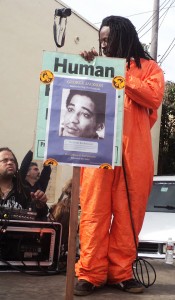
- Jabari Shaw, former prisoner and current activist with All of Us or None, heralds George Jackson at the rousing Occupy San Quentin rally Feb. 20, 2012, just outside San Quentin’s main gate Photo Wanda Sabir
A lot of history is evoked by Steve’s hunger strike. San Quentin’s infamous Adjustment Center is where “Soledad Brother” George Jackson was housed when he was assassinated Aug. 21, 1971, the day commemorated every year in Black August. In turn, George Jackson, probably the most famous and influential U.S. prisoner of all time, was Gov. Arnold Schwarzenegger’s excuse for executing Stanley Tookie Williams.
The governor wrote in denying clemency to Tookie, triggering his execution hours later, on Dec. 13, 2005: “The dedication of Williams’ book ‘Life in Prison’ casts significant doubt on his personal redemption … (T)he inclusion of George Jackson on the list [of Black heroes in the book’s dedication] defies reason and is a significant indicator that Williams is not reformed and that he still sees violence and lawlessness as a legitimate means to address societal problems.”
Steve Champion’s “Gang validation: The new inquisition” begins by reporting a cell search and the confiscation of his legal materials and other writings “for possible gang validation. The reason for the action, I was told, was my possession of a Kiswahili dictionary and the book ‘Soledad Brother’ by George Jackson” – this after 28 years on San Quentin’s death row, with that book in his cell for most of those years.
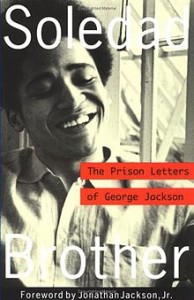
- George Jackson, field marshal of the Black Panther Party, assassinated by San Quentin prison guards Aug. 21, 1971.
Recalling the rebellion of Aug. 21, 1971, and fearing a repeat in response to Tookie’s execution 34 years later, San Quentin authorities confined Tookie’s closest friends, Steve Champion and Anthony Ross, to the Adjustment Center, an extremely restrictive form of solitary confinement much like the infamous Pelican Bay SHU. Thus, now that solitary confinement is recognized worldwide as torture, the particularly intense torture endured by Steve Champion is purely retaliatory. Steve is being tortured for his friendship with Tookie and Anthony and their admiration of George Jackson.
Steve writes in “Gang validation: The new inquisition”: “Prison administrators know that if even one prisoner shuns George Jackson’s books or other leftist material because he thinks he might be labeled a gang member and placed in the SHU, then the strategy of suppression is effective. …
“[Even] ‘apolitical’ prisoners will recognize on a general level that their own existential condition can be compared to George Jackson’s. It is this identification with George Jackson that makes him symbolically powerful and very much alive. And for this, he must be vilified and punished, over and over again – suppressed and chased away from anyone who dares consume his words.”
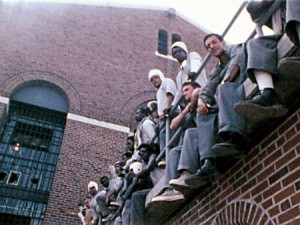
- The Attica rebellion in upstate New York Sept. 9-13, 1971, saw thousands of prisoners take over the prison, protesting intolerable conditions and infuriated by the assassination of George Jackson at San Quentin on Aug. 21, 1971. The secret of their unprecedented strength was their multi-racial solidarity. Here, Black and white prisoners sit on a wall during a meeting called by the organizers.
In the same essay, Steve also addresses what is likely to become – only three days from now – the number one prison story across the U.S.: the “end of hostilities” between prisoners in California declared by the leaders of last year’s hunger strike housed in the Pelican Bay SHU. That declaration is contained in “California prisoners make historic call for peace between racial groups in California prisons and jails,” published in the October Bay View.
Steve writes: “What also facilitates the suppression of political consciousness is the unending cycle of ethnic and sectarian violence that permeates the U.S. prison system. Violence is micromanaged to perpetuate racial hatred and division among prison groups.
“And let me be honest: Prisoners make it easy for prison administrators to accomplish this when they fail to redress the stark contradictions between their intransigent conflicts against each other and the repressive and often brutal treatment meted out to them by the prison regime.”
Solidarity among prisoners and between prisoners and all who believe in justice is the way to stop the madness of mass incarceration. Steve Champion’s hunger strike is a prime opportunity for showing prison administrators a better way.
The Bay View urges readers to flood San Quentin and CDCR with messages similar to the letter sent today by Professor Tom Kerr to San Quentin Warden Kevin Chappell with a link to Steve’s list of demands:
“Dear Warden Chappell,
“As Steve Champion’s friend and editor, I am writing to comment on the hunger strike that I understand he began on Oct. 4. Steve’s CDCR number is C-58001.
“Judging by his writing, by my nearly nine years of correspondence with him as his editor and friend, and by my several personal visits, Steve has, in 30 years on death row, become a remarkable person.
“I know that he would only resort to an action as dire as a hunger strike if he felt it were the last resort to get legitimate, if negotiable, grievances addressed. I know that he has long endeavored to work within the system, even when he has been critical of it.
“I hope you will view his hunger strike as an opportunity to reconsider or revisit the prison’s position on some of the issues he describes in his 602 petition and listed in his article in the San Francisco Bay View this past July: http://sfbayview.com/2012/the-struggle-never-stops/.
“I hope you will also ensure that Steve is treated respectfully and appropriately, as he protests against policies and procedures that he strongly believes to be excessively degrading and punitive, even in the extreme situation of death row. I trust that you will both respect the convictions and integrity driving his protest and work quickly toward a constructive solution.
“Thank you for considering my thoughts.
“Sincerely,
“Tom Kerr, PhD, Ithaca College”
Your message may also be as simple as the one noted above: “We are aware of Steve Champion’s hunger strike and concerned for his health. We look to you to respond to him promptly, constructively and appropriately.”
Video below: Johnny Cash’s 1969 performance at San Quentin. Other videos showed he played to a segregated audience then, composed solely of white prisoners, although the majority are Black and Latin. But his message resonates still, as prisoners of all races have issued a historic call for unity.
For ease of reference, here are Steve Champion’s demands:
by Steve Champion
“You can measure the level of a civilization by entering its prisons.” – Fyodor Dostevsky
On July 1, 2011, men held captive and confined in Security Housing Units (SHU) in Pelican Bay State Prison went on an unprecedented hunger strike to peacefully protest torturous, inhumane, barbaric and draconian-type conditions they were subjected to live under. Prisoners who were languishing in SHU isolation and administrative segregation throughout California heeded the call by the Pelican Bay hunger strikers and joined them. Most of the death row population isolated in the infamous adjustment center (AC) in San Quentin supported and participated in the hunger strike as a way to show solidarity.
A second hunger strike was called by the Pelican Bay Human Rights Movement in September 2011, because top California Department of Corrections (CDC) administrators in Sacramento began dragging their feet and back-tracking on previous promises and agreements they made. In the end, CDC made minor concessions but terribly failed to act in good faith in addressing the most critical issues, like indefinite SHU isolation, the debriefing process and gang validation.
In fact, what CDC did do is craft together a flimsy step-down program that doesn’t deal fairly with the issue. See the article published in the April 2012 Bay View titled: “Pelican Bay Human Rights Movement presents counter-proposal opposing CDCR ‘Security Threat Group Strategy.’”
In spite of the ongoing negotiations between the Pelican Bay Human Rights Movement and top CDC administrators, the San Quentin administration is resisting any attempt to improve the plight of death row prisoners housed in the AC. Unlike Title 15 – California’s Code of Regulations for all California prisoners – San Quentin top officials have concocted and enacted an exclusive code of regulations called the 608s, which mandate that death row prisoners are under the control of the warden of San Quentin. It is this illegal and repressive code of regulations that AC death row prisoners are vigorously challenging.
There have been several attempts by the San Quentin administration to discourage our goal to file a group 602 petition. It has been returned on two occasions and cancelled once. They sought to sublimate and obscure our grievances by trying to insist each individual must file a personal 602 even though our issues are collective grievances supported and endorsed across racial and ideological lines. The group 602 is still wrapped up in a labyrinth of bureaucracy. [Enclosed with Steve’s letter is a Group Appeal, CDCR 602-G, signed by 43 death row prisoners.]
Here are the nine core issues death row prisoners in the adjustment center are struggling to bring attention to and will fight to bring into existence:
1) Abolish the 608 or amend it to be in alignment with Title 15: In 2008, the Thompson decree, a code of regulations that governed California death row inmates, was abolished by the U.S. District Court. In the same year the San Quentin administration created their own code of regulations for death row inmates under the arbitrary control of the warden at San Quentin. One of the rules included in the 608 is an “indetermined SHU” program for anyone found guilty of two serious rules violation reports or one serious and two administrative rules violation reports within 180 days. The 608 needs to be abolished or amended. California death row inmates should be placed under Title 15, which is the California Code of Regulations for all California prisoners.
Cease the discriminatory practice of holding new death row arrivals in the Adjustment Center for an indeterminate amount of time without just cause. There should be no more than a 90 day “observation” period for new arrivals before institutional classification committee renders a decision on an inmate’s status.
Cease the use of confidential informants or 1030 disclosure forms to deny inmates access to Grade A programming, Grade B programming in East Block or access to a group yard in AC.
Cease the use of confidential informants or 1030 disclosure forms to label inmates as “prison gang members,” “gang associates” or involved in gang activity, unless there is factual corroborating evidence, in which case San Quentin’s staff shall and must follow the regulations by issuing a rules violation report affording the inmate his due process as required by law. The San Quentin staff must specify the rules and criteria clearly – no vagueness or contradictory rules. The Castillo should be used and the most recent criteria created and implemented stemming from the hunger strikers in PBSP or from LEIU (Law Enforcement and Investigation Unit).
End long-term confinement in the AC: Some death row inmates have been in AC for 20, 15 and 10 years. Create a program for these inmates and other AC inmates who have been disciplinary free for a year and grant them some form of privileges as given Grade A inmates.
2) Expand and provide constructive programming and privileges for the AC death row inmates. For example:
Expand visiting to two hours for people traveling over 250 miles.
Allow two telephone calls per month.
Allow inmates to take four photos per year.
Allow four yearly packages per year, or increase the unit to 50 pounds.
Allow more TV channels – channels of substance like the history and discovery channels.
Raise the number of personal books condemned B are allowed to have to 10.
Allow us to get our education (GED) and take college courses.
Allow a proctor to come in to test us in our studies within the unit.
3) Cease the policy of group/collective punishment and hiding behind the policy of safety and security. For example, in 2007, the AC administration implemented a policy to collectively punish and humiliate all AC inmates. All AC inmates were required to wear leg restraints and shower shoes only whenever being escorted outside their cell or unit. We were also required to be strip searched outside at yard recall time. After two years the wearing of leg-restraints was rescinded. This entire policy was supposed to be temporary. We want:
To be able to wear personal tennis shoes, or state shoes, to and from the yard; and on all escorts inside or outside the unit.
To be able to wear state clothing to the law library, especially during inclement weather; T-shirt and underwear during rain storms are both inhumane and not required in any other part of San Quentin.
To cease being strip searched on the exercise yard when it’s raining or during inclement weather.
4) Provide healthy, nutritional and adequate food, and expand the canteen.
Allow AC inmates to be allowed to purchase vitamin supplements and protein meal supplements from approved vendors without it being counted as an annual package.
Cease the practice of removing the plastic covers off the bread, cookies and chips, which is required in order for daily freshness to be preserved.
Oversee how the meals and trays are being prepared; too often the breakfast/dinner food trays are not adequately cleansed.
Bring back the “hot food cart.”
Increase spending limit for canteen and offer a wider selection of food items.
5) Provide exercise equipment on the group yards and group yard program.
Return the basketball court.
Return the pull-up bar; place a dip bar and two tables on each yard.
Allow items to be brought out to the yard, such as soap, shampoo, coffee, lotion and a tumbler.
Provide the group yard with activity items – checkers, chess, cards and handballs.
6) Medical: Honor all medical chronos issued from and approved by the chief medical officer. Custody staff should have no say so on any medical needs of prisoners. If the medical need of an inmate cannot be met in the AC, then the inmate should be housed in a unit where his medical needs can be accommodated.
The AC unit staff must not be permitted to impose unjust punishments upon prisoners who have proven a necessity for medical appliances. When it is deemed medically imperative for modified cuffs, staff puts the prisoner on leg restraints claiming “safety and security,” when in fact it is an attempt to discourage prisoners from seeking medical appliances by punishing them with unnecessary, painful, degrading and excessive mechanical restraints.
7) Clothing and grooming: The AC administration has been derelict in their duty to provide and exchange linen on a timely or regular basis.
Allow AC inmates to purchase their own white boxer underwear, T-shirts and socks from approved vendors.
Allow us to purchase rain jackets, since the AC seems unable to provide them to all AC inmates on anything other than “first come first serve” basis.
Allow us to have a mirror and comb, provided by the state, in the cell.
Allow us to shave when scheduled for a visit as is done in other SHU programs in California.
Allow us to order thermals from approved vendors.
8) Legal law library: Since the AC staff (the sergeant) has taken control of assigning and scheduling AC inmates for SHU law library, it’s been inconsistent.
Return the scheduling of AC inmates for SHU law to the SHU law clerk.
Scheduling and rescheduling AC inmates for SHU law takes too long. There are enough holding stalls when utilized that can allow an inmate (when he signs up) to be assured law library twice a month.
Provide regular access to the main library.
9) Hobby craft: We want to be allowed color pencils and pens and color paper.
Steve Champion is on California’s death row at San Quentin. Send our brother some love and light: Steve Champion, C-58001, San Quentin State Prison, San Quentin CA 94974. And read his book, “Dead to Deliverance: A Death Row Memoir,” available at amazon.com or Split Oak Press, splitoakpress.com.
To reach the Bay View, email editor@sfbayview.com.
To subscribe to this list, email sfbayview-subscribe@lists.riseup.net.
To unsubscribe, email sfbayview-unsubscribe@lists.riseup.net
—
Mary Ratcliff
SF Bay View
(415) 671-0789

